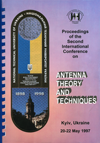An universal extremely fast-convergent iterative synthesis technique for antennas and microwave components
DOI:
https://doi.org/10.1109/ICATT.1997.1235104Abstract
The powerful generalized diffraction synthesis technique for high performance reflector antennas has been recently developed in [1], Fig. 1. However versatility and accuracy of this method are obtained at the price of computation time due to PO integrations and slow iterative process convergency. Presented in this article is an universal extremely fast-convergent iterative synthesis technique for antennas and microwave components (Fig. 2). Idea of this technique and its effectiveness for microwave components have been illustrated in [2, 3].
Fast convergence and high accuracy of this technique is achieved by combining of approximate synthesis (analytical or parametric) and accurate (rigorous) analysis which are properly put into optimization iterations. Unique in this method is that in each iteration a new modified, untrue, design objectives, formed in accordance with obtained differences between calculated characteristics of interest and true design objectives, is created and used in approximate synthesis in next iteration. Due to this innovatin object function is minimized and optimization process is completed after a few (three or even two) optimization iterations.
References
Duan, D.; Rahmat-Samii, Y. A generalized diffraction synthesis technique for high performance reflector antennas. EEEE Trans. Antennas and Propagation, Vol. 43, No 1, January 1995, p. 27-39.
Dubrovka, F.F.; Stepanenko, P.Ya. Optimal synthesis of wideband filters. Radiotechnika and Electronica, 1993, p. 652-654.
Dubrovka, F.F.; Petrushevsky, Yu.V. Optimal double-level synthesis of wideband waveguide septum OMT and ridged polarizers and rotators. Proc. of 1995 URSI Symp. on Electromagnetic Theory, St.-Petersburg, Russia, 1995, p. 376-378.

